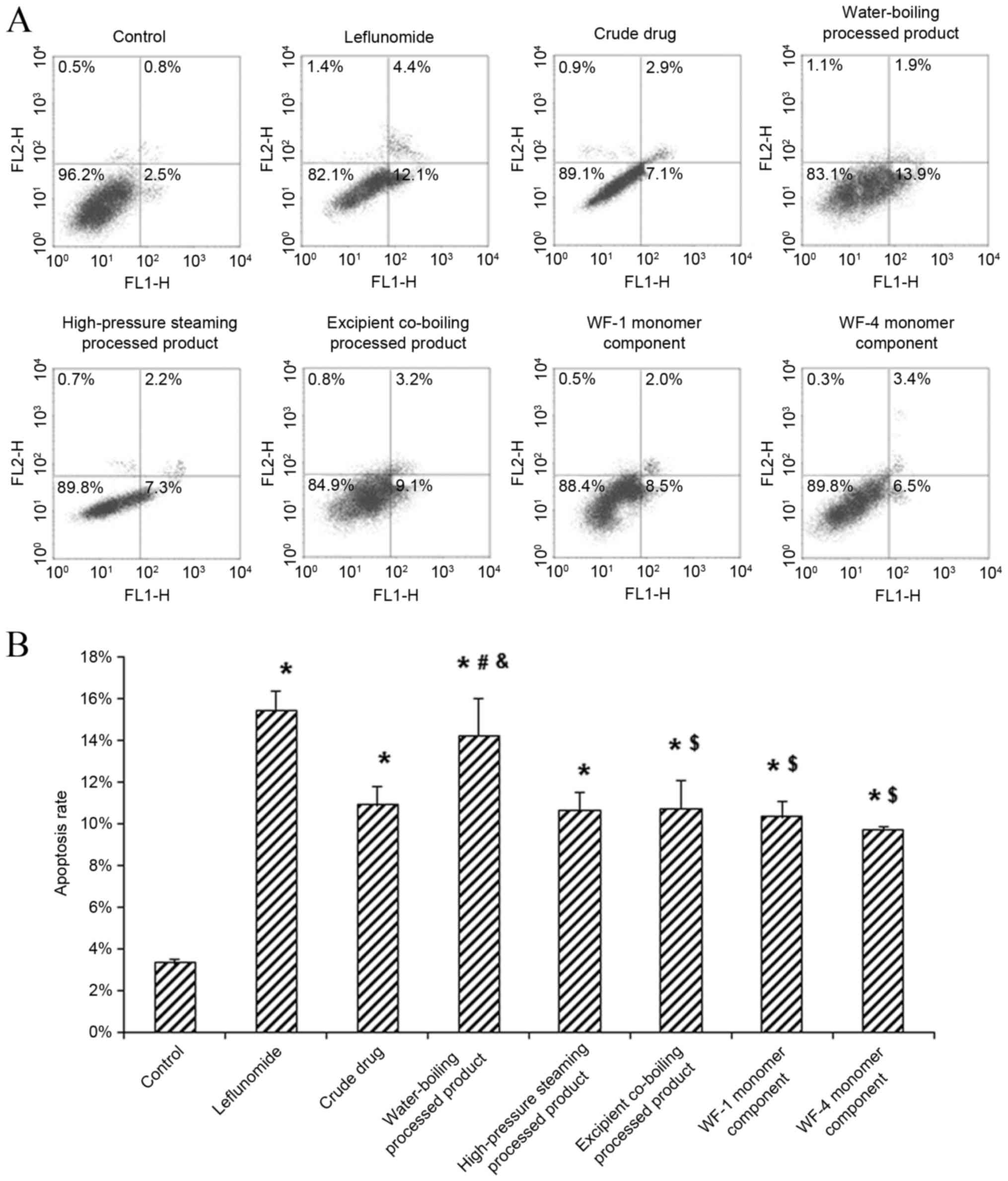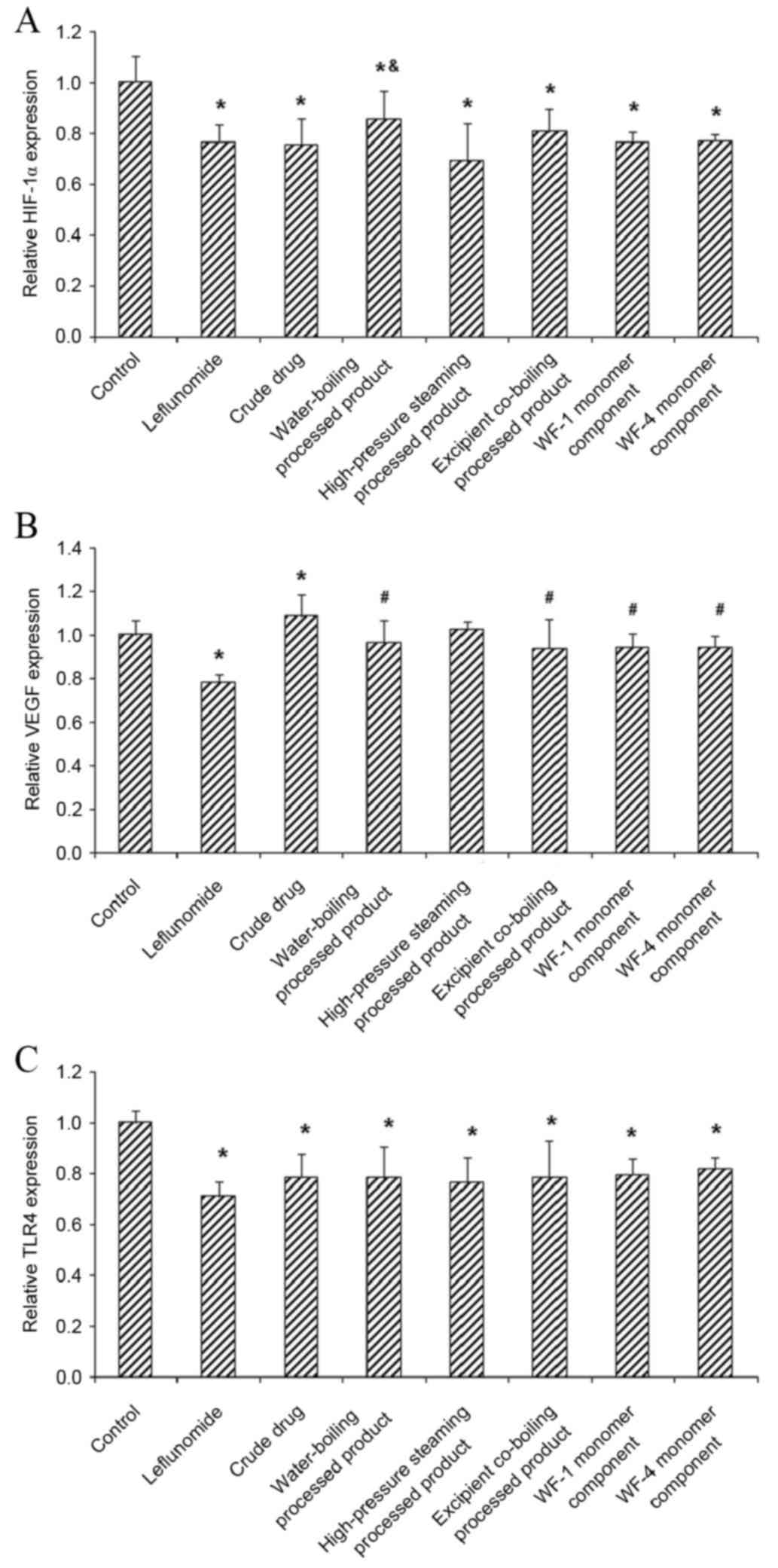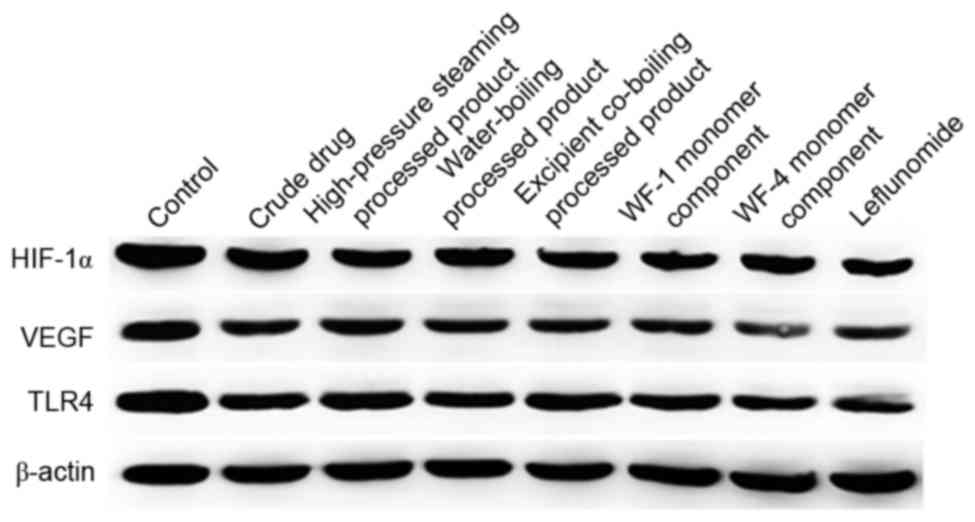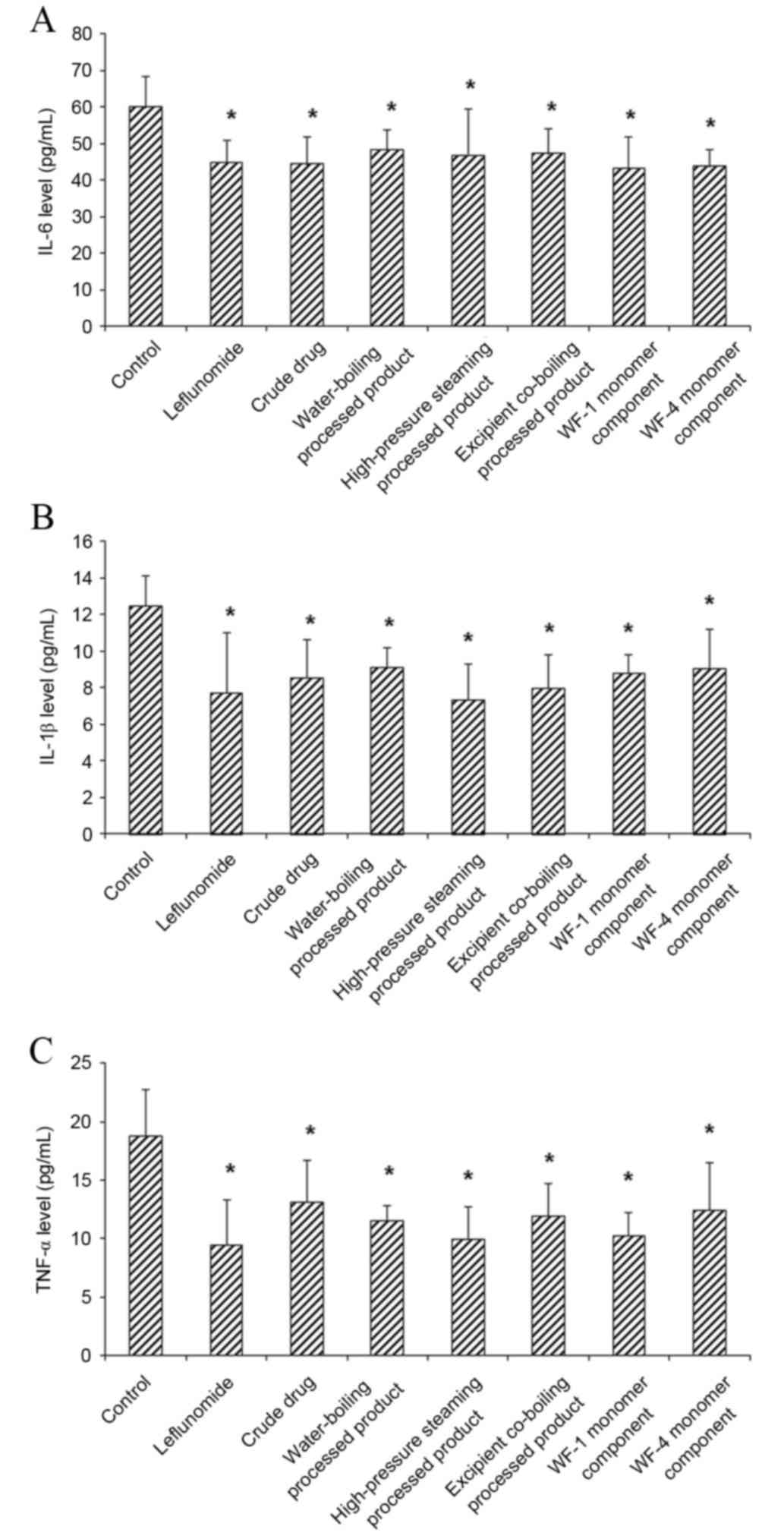|
1
|
Seyler TM, Park YW, Takemura S, Bram RJ,
Kurtin PJ, Goronzy JJ and Weyand CM: BLyS and APRIL in rheumatoid
arthritis. J Clin Invest. 115:3083–3092. 2005. View Article : Google Scholar : PubMed/NCBI
|
|
2
|
Yamaannishi Y and Firestein GS:
Pathogenesis of rheumatoid arthritis: The role of synoviocytes.
Rheum Dis Clin North Am. 27:355–371. 2001. View Article : Google Scholar : PubMed/NCBI
|
|
3
|
Wang JB and Pan L: Etiology and
pathogenesis of rheumatoid arthritis. Shandong Yi Yao Za Zhi.
42:69–70. 2002.
|
|
4
|
Perlman H, Pagliari LJ, Liu H, Koch AE,
Haines GK III and Pope RM: Rheumatoid arthritis synovial
macrophages express the Fas-associated death domain-like
interleukin-1beta-converting enzyme-inhibitory protein and are
refractory to Fas-mediated apoptosis. Arthritis Rheum. 44:21–30.
2001. View Article : Google Scholar : PubMed/NCBI
|
|
5
|
Sivakumar B, Akhavani MA, Winlove CP,
Taylor PC, Paleolog EM and Kang N: Synovial hypoxia as a cause of
tendon rupture in rheumatoid arthritis. J Hand Surg Am. 33:49–58.
2008. View Article : Google Scholar : PubMed/NCBI
|
|
6
|
Konisti S, Kiriakidis S and Paleolog EM:
Hypoxia-a key regulator of angiogenesis and inflammation in
rheumatoid arthritis. Nat Rev Rheumatol. 8:153–162. 2012.
View Article : Google Scholar : PubMed/NCBI
|
|
7
|
Huang X, Chen Y and Gong L: Measurement of
serum hypoxia inducible factor-1α in patients with rheumatoid
arthritis and the correlation with ultrasonographic assessment of
synovial lesions. Zhejiang Med J. 33:1420–1422. 2011.
|
|
8
|
Del Rey MJ, Izquierdo E, Usategui A,
Gonzalo E, Blanco FJ, Acquadro F and Pablos JL: The transcriptional
response of normal and rheumatoid arthritis synovial fibroblasts to
hypoxia. Arthritis Rheum. 62:3584–3594. 2010. View Article : Google Scholar : PubMed/NCBI
|
|
9
|
You P, Lin M, Li K, Ye X and Zheng J:
Normobaric oxygen therapy inhibits HIF-1α and VEGF expression in
perihematoma and reduces neurological function defects.
Neuroreport. 27:329–336. 2016.PubMed/NCBI
|
|
10
|
Cheng S, He C, Zhou H, Kong X, Xie H, Xia
L and Yan J: The effect of Toll-like receptor 4 on β2-glycoprotein
I-induced B cell activation in mouse model. Mol Immunol. 71:78–86.
2016. View Article : Google Scholar : PubMed/NCBI
|
|
11
|
Huang B, Wang QT, Liu KK, Jiang L and Wei
W: The relationship between TNF-α signaling pathway and CD4 + T
cells in the development of rheumatoid arthritis. Zhong Guo Yao Li
Xue Tong Bao. 29:900–903. 2013.
|
|
12
|
Xiao JY, Wang BS and Wang SJ: Expression
of IL-1 and TNF-α in adjuvant arthritis rat models. J Emer Trad
Chin Med. 20:607–608. 2011.
|
|
13
|
Manfredi AA, Baldini M, Camera M,
Baldissera E, Brambilla M, Peretti G, Maseri A, Rovere-Querini P,
Tremoli E, Sabbadini MG and Maugeri N: Anti-TNFα agents curb
platelet activation in patients with rheumatoid arthritis. Ann
Rheum Dis. 75:1511–1520. 2016. View Article : Google Scholar : PubMed/NCBI
|
|
14
|
Cacciapaglia F, Anelli MG, Rizzo D,
Morelli E, Scioscia C, Mazzotta D, Iannone F and Lapadula G:
Influence of TNF-α inhibition on oxidative stress of rheumatoid
arthritis patients. Reumatismo. 67:97–102. 2015. View Article : Google Scholar : PubMed/NCBI
|
|
15
|
Wang XK, Li B, Ren Y, Liang ZC and Yang
ZB: Effects of Alcohol Extract of toddalia asiatica on the
Inflammation-associated cytokines of model rats with Adjuvant
arthritis. Zhong Guo Yao Fang. 27:3524–3527. 2016.
|
|
16
|
Editorial Committee of Flora of China,
China Academy of Sciences: Flora of China. 27. Chinese Science
Publishing and Media Ltd.; Beijing: pp. 113–326. 1979
|
|
17
|
Xin Xu: Bahaerguli Huangerhan. Kazakh
Pharmacopeia. 1. Ethnic Publishing House; Beijing: pp. 45–47.
2009
|
|
18
|
Meng Q, Liang J and Wu G: Advances in
pharmacological effects of alkaloids. Lishizhen Med Materia Med
Res. 14:700–702. 2003.
|
|
19
|
Xinjiang Institute of Biological Soil
Desert, . Xinjiang Medicinal Flora. 1. Xinjiang People's Publishing
House; Urumqi: 1977
|
|
20
|
Editorial Committee of Flora of Xinjiang,
. Flora of Xinjiang. 1. Xinjiang Science and Technology Health
Press; Urumqi: 1999
|
|
21
|
Yang JL, Lu J, Liu J and Nie JH: Effects
of Diphtheria Aconitum and processed products on adjuvant-induced
arthritis rat model. Chinese Medicine. 37:2495–2501. 2015.
|
|
22
|
Wang F, Zhao J, Zhao F and Nie J: Study on
the chemical constituents of Aconitum leucostomum Worosch. China
Pharmacy. 26:1233–1235. 2015.
|
|
23
|
Wu M and Wei Y: Ethnobotany of Aconitum in
Xinjiang. Chinese Wild Plant Resources. 23:29–30. 2004.(In
Chinese).
|
|
24
|
Editorial Committee of Chinese
Pharmacopoeia, . Chinese Pharmacopoeia. 1. Chinese Medical Science
and Technology Press; Beijing: pp. 33–34. 2010
|
|
25
|
Wiacek R, Kolossa K, Jankowski T, Jeka S,
Karmowski A, Karmowski M and Gworys B: The efficacy and safety of
leflunomide in patients with active rheumatoid arthritis. Adv Clin
Exp Med. 21:337–342. 2012.PubMed/NCBI
|
|
26
|
Livak KJ and Schmittgen TD: Analysis of
relative gene expression data using real-time quantitative PCR and
the 2(−Delta Delta C(T)) Method. Methods. 25:402–408. 2001.
View Article : Google Scholar : PubMed/NCBI
|
|
27
|
Chen L, Wang WS, Wang YM and Shi CH: The
expression of VEGF and TGF-β1 in synovial membrane of the patients
of Knee joint pannus. Shi He Zi Da Xue Xue Bao (Zi Ran Ke Xue Ban).
28:72–75. 2010.
|
|
28
|
Shiozawa S, Tsumiyama K, Yoshida K and
Hashiramoto A: Pathogenesis of joint destruction in rheumatoid
arthritis. Arch Immunol Ther Exp (Warsz). 59:89–95. 2011.
View Article : Google Scholar : PubMed/NCBI
|
|
29
|
Brouwer E, Gouw AS, Posthumus MD, van
Leeuwen MA, Boerboom AL, Bijzet J, Bos R, Limburg PC, Kallenberg CG
and Westra J: Hypoxia inducible factor-1-alpha (HIF-1alpha) is
related to both angiogenesis and inflammation in rheumatoid
arthritis. Clin Exp Rheumatol. 27:945–951. 2009.PubMed/NCBI
|
|
30
|
Shankar J, Thippegowda PB and Kanum SA:
Inhibition of HIF-1alpha activity by BP-1 ameliorates adjuvant
induced arthritis in rats. Biochem Biophys Res Commun. 387:223–228.
2009. View Article : Google Scholar : PubMed/NCBI
|
|
31
|
Huang XQ, Chen Y, Chen LB, Gong LM, Xie
BH, Peng Y, Huang H, Xin XF, Wu XD and Zhang Z: Measurement of
serum vascular endothelial growth factor, angiopoietin-1 and
angiopoietin-2 in patients with rheumatoid arthritis and the
correlation with synovial lesions. Chin J Rheumatol. 16:679–683.
2012.(In Chinese).
|
|
32
|
Migita K, Miyashita T, Maeda Y, Nakamura
M, Yatsuhashi H, Kimura H, Ishibashi H and Eguchi K: Toll-like
receptor expression in lupus peripheral blood mononuclear cells. J
Rheumatol. 34:493–500. 2007.PubMed/NCBI
|
|
33
|
Ning X and Lu ZJ: Expression of
Fibrosis-related Cytokine in Budd-Chiari Syndrome. Chin Gen Prac.
18:2026–2029. 2015.
|
|
34
|
Chou LW, Wang J, Chang PL and Hsieh YL:
Hyaluronan modulates accumulation of hypoxiainducible factor-1
alpha, inducible nitric oxide synthase, and matrix
metalloproteinase-3 in the synovium of rat adjuvant-induced
arthritis model. Arthritis Res Ther. 13:R902011. View Article : Google Scholar : PubMed/NCBI
|
|
35
|
Westra J, Brouwer E, van Roosmalen IA,
Doornbos-van der Meer B, van Leeuwen MA, Posthumus MD and
Kallenberg CG: Expression and regulation of HIF-1alpha in
macrophages under inflammatory conditions; significant reduction of
VEGF by CaMKII inhibitor. BMC Musculoskelet Disord. 11:612010.
View Article : Google Scholar : PubMed/NCBI
|
|
36
|
Aletaha D, Neogi T, Silman AJ, Funovits J,
Felson DT, Bingham CO III, Birnbaum NS, Burmester GR, Bykerk VP,
Cohen MD, et al: 2010 Rheumatoid arthritis classification criteria:
An American college of rheumatology/european league against
rheumatism collaborative initiative. Arthritis Rheum. 62:2569–2581.
2010. View Article : Google Scholar : PubMed/NCBI
|
|
37
|
Hochberg MC, Altman RD, Brandt KD, Clark
BM, Dieppe PA, Griffin MR, Moskowitz RW and Schnitzer TJ:
Guidelines for the medical management of osteoarthritis. Part II.
Osteoarthritis of the knee. American College of Rheumatology.
Arthritis Rheum. 38:1541–1546. 1995. View Article : Google Scholar : PubMed/NCBI
|
|
38
|
Cramer T, Yamanishi Y, Clausen BE, Förster
I, Pawlinski R, Mackman N, Haase VH, Jaenisch R, Corr M, Nizet V,
et al: HIF-1alpha is essential for myeloid cell-mediated
inflammation. Cell. 112:645–657. 2003. View Article : Google Scholar : PubMed/NCBI
|


















